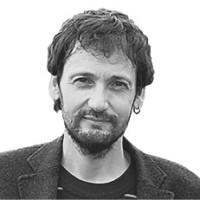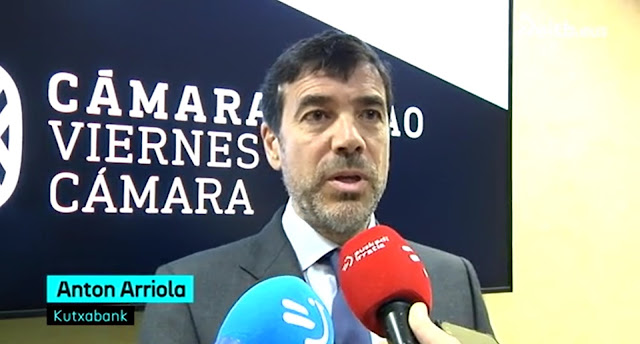Catar, football and hospitals (Palpando in the semantic desert soaked with disturbing echoes)
Every now and then, while I'm doing something in the kitchen, I'm turning on Euskadi Irratia, early in the morning. Last day, two stories were crossed in the comments of the informants and Tertullians: the first, published by the newspaper The Guardian on February 23: “More than 6,500 migrant workers from India, Pakistan, Nepal, Bangladesh and Sri Lanka have died in Qatar since it won the right to host the World Cup 10 years ago.” In ten years, more than 6,500 workers, all migrants, have died in Qatar in the construction of facilities that will host the next World Cup of Football. A couple of deaths a day. From there, each of the thirty-two teams that will go to the final stage of the championship will be killed by more than two hundred. A new city in the desert to build highways, airports, stadiums, the FIFA World Cup. For every famous footballer who goes there, a number of workers who have died in absolute misery should be counted. Arithmetic macabra, yes. Who will dare to make that mixture of such bad taste – between football, emotion and those outcasts condemned to death? Giant businesses, great identity feelings, slavery, death…
I believe that those of us who are not satisfied with what “is” are asked to immerse us in these increasingly turbulent waters and to try to differentiate them and relate them to the extent.
The second news item with live connection is as follows: "The Royal Society takes the King's Cup to the workers of the Donostia Hospital. “This Cup is also yours,” said lehendakari Jokin Aperribai, accompanied by coach Imanol Alguacil, Captain Asier Illarramendi and the final scorer Mikel Oyarzabal. My astute mind has made the news give another reading: “A Gipuzkoa gun manufacturer has offered the head of the ICU of the Hospital and a nurse a trophy donated by the king of Spain Felipe VI.ak.” It is known that the weapons that are made in Gipuzkoa have a great deal of traffic with states like Saudi Arabia and that the Spanish monarchy has a perfect relationship with those there: Petro-monarchy, football, weapons, wars…
The most rationalistic Tertullian of the Basque Country, a few seconds ago when I shut down the radio, made the following reflection: “In a few years’ time those then will find it grotesque what is going on here” (it was a mix of the King’s Cup and the great work of the hospital workers). But those who join the feelings of the majority will find a new reflection in the face of such disorders: “Why not take advantage of this exciting moment to impregnate the sacrifices of the hospital caregivers of our most noble feelings? That is all that has become apparent; it is a desire to confuse these things with the misery of football, corrupt monarchies, arms manufacturers and the deaths of slave workers.”
But it seems to me that things -- the pandemic, football, hospitals -- have spent a lot of time out of their boxes, and listening to this news one after the other, I can't help but get involved in this kind of confusing thoughts. And turning things even further, here's the question I've been asked. Is it not possible to associate itself with the fate of those who lose their lives in Qatar and those who sacrifice in the hospital the best of their life? Is it not possible to associate if it has already lasted a year and what will last is the world social war without mercy that Qatar's example of the pandemic shows?
There has always been a tendency to build sacrificial altars to the gods of each moment to offer them the blood of the defeated warriors, or of all kinds of heretics; and also of the virgins or young ones who will “satiate the dragon”. Capitalism has also built its altars for its sacrifice and, reluctantly or against, the macabre ritual should not be interrupted.
We believe that the former Altars Sacrifices were the result of the superstitions and the evil powers erected within it. Leaving aside the religions and superstitions of yesteryear, in Science we have faith and hope – charity was the third theological virtue, and we would like to direct that mercy of yesteryear towards the rational and sincere use of that science. But isn't that what we call science occupying the place that religions used to have in us? I don't mean the principles that science uses, like I don't mean the gospels or the personal choices that many spirits make honest and generous when I talk about religion.
It breathes a system based on discrimination, war and the theft of the weakest, and it reinforces the awareness of risk as the basis of social life... These are some of the characteristics of the situation in which we live.
The philosopher Peter Sloterdijk is among those who have reflected on the theme “the phenomenon of religion after the death of God”. In your life book, you have to change five norms to learn about the phenomenon of religiosity. The third of them says: “The possibility of something lies in its impotence,” which is the only thing that is a believer, that abandons empiricity and goes into the field of the really existing impotence. “Anyone who tries this standard will get the flexibility to treat the artist with the impossible” (Du mußt dein Leben ändern; Suhrkamp 2009. Your dois changer ta vie! ; Maren Sell 2011 You have to change your life. On anthropotechnique; Pre-texts 2012. Mention of this last translation 96.orrialdean. Aren’t the “Sciences” and their later technologies occupying the place of religion in the richest parts of the world? And I say religion because there is nothing that can be called “science,” but many sciences, or at most something that can be called “scientific method.” And propagandists and clergy who incite this religious sense lead us to believe in the “existence of something impossible”: “Science will solve all the problems that humanity has. Solutions have always been found and will continue to be so as the resistance of blind people in obscurantism is overcome.” The new religion promises us to overcome all illnesses and death itself, as well as all the misery linked to a limited life. If it cannot be today, tomorrow, if it cannot be here, on Mars.
It is more clearly explained by another European philosopher, Giorgio Agamben, in his article entitled “Science” and “Medicine”, which he has written as Medicine as a religion in times of pandemic:
“The fact that science has become a religion of our time, that is, what humans believe, has been evident for a long time [...] Science, like any religion, knows different forms and degrees through which it organizes its structure: to build a subtle and rigorous dogmatic in time, in practice, corresponds to a very broad and capillary field, which corresponds to what is called a religious war [...] It is not about taking medicine or undergoing medical examinations or surgery when necessary: all human life must be a celebration of permanent worship [medical care] at all times.”
When we have a serious health problem, we all go to the doctors, perhaps to the hospital, without thinking more, and without them we would be many dead. On the other hand, when a “health emergency” occurs, we have fewer opportunities than ever to think about health issues: they ask us and we give them full confidence. We put ourselves in the hands of those who know and fulfill their orders; everything else is a waste of time and a desire to stir up, when it is not irresponsible.
Faith, hope… and obedience. But have they not always been linked to the totalitarian realization of religion? A hundred years ago, which couple in our rural environment would come to live together and make children without being married, without going through church? And if you do, with what conclusions? What will be the consequences of those who are not willing among us to comply with all the protocols and obligations imposed by the health system? And the clerics of the time and the current medical commissioners gave and have similar and indisputable reasons: “There is nothing more to do with the laws of God/Science to save life.”
I have no doubt that the doctors and nurses who received with emotion this cup that was given to the Donostia football team are honest people and demanding professionals. I think those workers are doing everything in their power to help sick people and save their lives. They have said many times that they were within the limits of their forces and that they were overflowing. I think so.
They are also obliged, in a system that internalizes us all, to make their sacrificial contribution, such as the enslaved migrant workers of Qatar, even if it is at another level. But at the same time, you cannot go through the blood-soaked hands of those who offered that cup – the gun manufacturer, the 2022 World Cup of Football – and beyond the individual feelings of that representation, it may be legitimate to think that our health system and the industries of human destruction and war are the discovery and forgetfulness of the same coin.
Health can be our fetish. In his name, we are obsessively speaking of the “war against the pandemic” and are immersed in the latest battle that aims at the “global immunization campaign”. Under this cover, the authorities manage to get us to support the technological imbalance or social control projects.
I would like to illustrate the above statement with the reflection of a third favorite philosopher. Thinker Ivan Illich conducted a thorough study at the end of the 20th century on medicine and other institutions. At the last time of his life he spoke of “epistemic sentimentalism.” It is a “semantic desert full of confusing echoes.” When we immerse ourselves in it, we need a “fetish of prestige” to be able to use it as cover or boot security. Health can be our fetish. In his name, we are obsessively speaking of the “war against the pandemic” and are immersed in the latest battle that aims at the “global immunization campaign”. Under this cover, the authorities manage to get us to support the technological imbalance or social control projects. Illich called this epistemic sentimentalism, because they appropriate objects constructed of knowledge, naturalize them and turn them into “famous fetishes”. In these months we have to protect and save lives and, in the name of it, to extol the health system and the measures taken by the authorities in favour of this health have become indisputable. The noble objectives of this level open the door to a wave of feelings, hoping that all this will ever end, stagnating separating the “health accounts” and everything else. These days we are within the vaccination campaign that supposedly will bring general immunization: “Your vaccine protects me, my vaccine protects you” are filled with afixes. And with the clear messages of the Basque Government: “The goal is gradually to reach all citizens, but since there are not enough doses, we have to wait for our turn and show solidarity with the weakest or most exposed to the infection.” It's a feeling that covers everything that happens around the vaccine, let's not say any questions or debates about managing the pandemic and the health care system. Who is not worried about others? Who will be able to deny the most vulnerable their hand? From these questions embraces epistemic sentimentalism. As a result, we turn a ghostly reality into “humanitarian” or merciful, completely concealing all the other things that are happening.
Intensifying the awareness of risk and in the name of Life and Health, massive experiments are underway to control and channel society; to prioritize telematics for human relations, work and education; to increase police control… A system is breathed based on discrimination, war and theft of the weakest, and the awareness of risk as the basis of social life is reinforced…
I believe that those of us who are not satisfied with what “is” are asked to immerse us in these increasingly turbulent waters and to try to differentiate them and relate them to the extent.
Bidali zure iritzi artikuluak iritzia@argia.eus helbide elektronikora
ARGIAk ez du zertan bat etorri artikuluen edukiarekin. Idatzien gehienezko luzera 4.500 karakterekoa da (espazioak barne). Idazkera aldetik gutxieneko zuzentasun bat beharrezkoa da: batetik, ARGIAk ezin du hartu zuzenketa sakona egiteko lanik; bestetik, egitekotan edukia nahi gabe aldatzeko arriskua dago. ARGIAk azaleko zuzenketak edo moldaketak egingo dizkie artikuluei, behar izanez gero.
A few weeks ago, on Diputación Street, in the centre of Vitoria-Gasteiz, two men threw a homeless person off the small landing outside the place where he slept. In addition to being thrown away, a metal railing was immediately placed in front of the lonja. Although the place... [+]
The lights of the theater are on. Discreetly, I’m walking on the steps: the school performance is about to begin. The young men run to their seats, full of life and joy. The retreat has the taste of liberation, but this feeling of freedom speaks Spanish or French. This... [+]
Wikipedian bilatu dut hitza, eta honela ulertu dut irakurritakoa: errealitatea arrazionalizatzeko metodologia da burokrazia, errealitatea ulergarriago egingo duten kontzeptuetara murrizteko bidean. Errealitatea bera ulertzeko eta kontrolatzeko helburua du, beraz.
Munduko... [+]
Egypt ' s urban planning plan for the Gaza Strip has recently been expanded. A drawing shows the streets, buildings and imagery of the future on a reality that still smells of shrapnel and explosives. The urban planning proposal, used as another bomb shot. Individual house... [+]
Bizitza erdigunean jartzeko abagunea ikusi genuen feministok zein ekologistok Covid-19 pandemia garaian. Ez ginen inozoak, bagenekien boteretsuak eta herritar asko gustura itzuliko zirela betiko normaltasunera. Bereziki, konfinamendu samurra pasa zutenak haien txaletetan edo... [+]
Segurtasun falta dagoen irudipena handitu dela azaldu du Eustaten azken txostenak. Gurean, Trapagaranen, Segurtasuna orain, delinkuenteen aurka manifestaziora deitu dute herritar batzuek.
Bi izan dira sentsazio hori zabaltzeko arrazoiak. Batetik, udalak Udaltzaingoaren... [+]
There are those who subscribe to portals to sell their homes because they would like to buy a house. From time to time they even make appointments to see the houses, and I am sure that the seller knows that these people will not buy the house, not because they find it in the... [+]
Haurtzaroaren amaiera eleberri distopikoa idatzi zuen Arthur Clarkek, 1953. urtean: jolasteari utzi dion gizarte baten deskribapena. Eta ez al da bereziki haurtzaroa jolasteko garaia? Jolasteko, harritzeko, ikusmiratzeko eta galdera biziak egiteko unea. Ulertzeko tartea zabalik... [+]
The writer Juan Bautista Bilbao Batxi worked in a boat and sent the chronicles of his travels to the newspaper Euzkadi. Thanks to this, we have interesting chronicles in Basque from around the world from the beginning of the 20th century. In June 1915, he made his stop in... [+]
From linguistics or glotophobia and, of course, hatred against Basque, we have often seen our Basque become the dandruff of all sticks. Last of all, the president of Kutxabank, Anton Arriola, has been shaking our language and giving us galantas.The President of Kutxabank,
... [+]
Do not look for this connection from Ezkio or Altsasu, let alone crossing the Ebro River through Castejón. The connection, or rather the connections, between the Basque Y and the AVE of Navarre is already a reality. It is these links in the plural that should concern us and... [+]
Don't make a fuss, don't confront, don't victimize... and obey. As oppressed subjects, in this case as Basques, we talk, how many times have we had to listen to them? Ironically, two years ago, at the Euskalale Independentiston Meeting, Esne Arzallus said: "We have arrived here,... [+]
Aurten "Israel Premier Tech" txirrindularitza talde israeldarra ez da Lizarraldeko Miguel Indurain Sari Nagusia lasterketara etorriko. Berri ona da hori Palestinaren askapenaren alde gaudenontzat eta munstro sionistarekin harreman oro etetea nahi dugunontzat, izan... [+]
Intsumituek denbora luzez egindako borroka gogorra eta mingarria izan zen, baina irabazi zuten, eta garaipen hura behin betikoa izango zela uste genuen, atzera bueltarik gabea. Baina badirudi, politikari batzuen ahotik aterata, eskalada militaristari gorazarre egin eta berriz... [+]


















